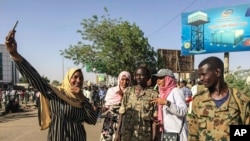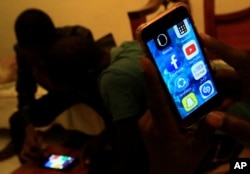Nadia Taha contributed to this report.
WASHINGTON — Ousted President Omar al-Bashir and his government restricted popular social media platforms during protests against his government, but millions of Sudanese found ways to circumvent the restrictions and rally others to protest peacefully.
On the night of April 8, just three days before Bashir would be deposed, Sudanese native Sara el-Hassan had her eyes glued to Facebook and Twitter. Live video from Khartoum was streamed to her computer screen at her home in Phoenix, Arizona, and information was flowing through her Twitter timeline.
Social media was the most effective way for her to connect with fast-moving developments back home. El-Hassan said it kept Sudanese inside and outside the country connected, but it also kept them safe and informed.
"I don't think this revolution would have happened without social media, in my personal opinion. It has been an integral part of the resistance movement, whether it be through sharing information, coordinating, people coming together to sharing the news of what is happening on the ground and getting it to be covered by news outlets," el-Hassan told South Sudan in Focus.
Platforms blocked
NetBlocks.org, a social media monitoring platform, reported during the course of Sudan's revolution that social media platforms were continuously blocked in Sudan even as the protests intensified. Users defied the ban by using virtual private network internet circumvention tools.
Last Thursday, NetBlocks reported Twitter, Facebook, Whatsapp and other social media platforms were fully restored the same day the military announced Bashir's ouster.
Social media proved to be crucial because the state had a tight grip on conventional forms of media, according to some local journalists. With a ranking of 175 out of 180, Sudan is one of the least free countries globally, according to this year's World Press Freedom index. Reporters without Borders, which published the index, said journalists and media were among the "leading victims" of the crackdown during antigovernment protests since December.
In January, the Committee to Protect Journalists reported Sudan's government revoked credentials for six foreign journalists, a move CPJ said was an attempt to "muzzle the press" during the period of unrest.
Alternative ways
Alawia Muktar, a journalist in Sudan, said the former government's repression of the press meant journalists like her had to find alternative ways to receive and disseminate information.
"The social media played a very big role in the Sudanese uprising-revolution because Sudan's main media were blocked to report about the protest. Even the international media were not allowed to report," Muktar told South Sudan in Focus.
Translations from Arabic were also done in real time by native Arabic speakers on Twitter and Facebook in order to share developments to a wider audience. Sudanese Translators for Change translated Tweets and Facebook messages to inform organizers and the world at large.
Social media was also used to combat fake news or misinformation, according to Isma'il Kushkush, a Sudanese reporter and former acting East Africa bureau chief of The New York Times. He said this time, it was also used for security purposes.
"It used to be that many activists would approach the usage of social media without paying much attention to the importance of security, and that is how many were tracked down in previous years. This time, there was greater attention to the importance of maintaining security," Kushkush told South Sudan in Focus.
Greater freedom
Since the military announced the end of Bashir's rule last week, many Sudanese have said they are already enjoying greater freedom, including freedom of expression. El-Hassan said she hopes this is the new normal.
"Sudan has been living in darkness. The NCP regime, the Bashir regime, has really capitalized on disconnecting Sudan from the rest of the world. No one really knows who we are or what we're going through, except for the little snippets that make their way out. But day to day, nobody really knows the reality of Sudanese people's lives," El-Hassan told VOA.
The fight for a free and inclusive Sudan continues, according to el-Hassan, who said the revolution is not just about ousting the government, but about overhauling Sudanese society.





